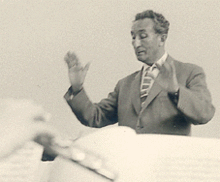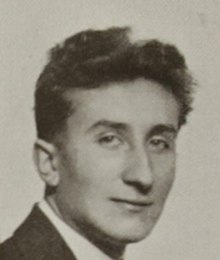Kurt Thomas (composer)
Kurt Thomas (born May 25, 1904 in Tönning , † March 31, 1973 in Bad Oeynhausen ; full name Georg Hugo Kurt Thomas ) was a German composer , music teacher and choir director .
Life
From 1910 the family lived in Lennep in the Bergisches Land. Kurt Thomas attended the Röntgen High School there from 1913 to 1922 . Then, on April 21, 1922, he was enrolled in law and music at the University of Leipzig . He finished his studies in 1925 and worked as a lecturer in music theory at the State Conservatory of Music in Leipzig . In 1927 he received the Beethoven Prize of the Prussian Academy of the Arts for his Opus 1 "Mass in A minor" . In 1928, through the mediation of Karl Straube, he was appointed composition teacher and head of the choir of the Leipzig Church Music Institute . Later he toured Germany with the Madrigal Choir, renamed “Kurt-Thomas-Kantorei”. From 1934 to 1939 Thomas worked as a professor of choral conducting at the Academic University of Music in Berlin.
His closeness to the National Socialist system can be seen, among other things, from a complaint to the Reichsmusikkammer on November 6, 1935 , in which he emphasized that, although he was “full Aryan” in the sense of the Nuremberg Laws , he was in Brückner's Musical Jewish ABC , while “100 percent representative Jewish unculture, such as B. Kurt Weill were missing ”. In 1936 he composed an Olympic cantata as part of a music competition of the Reichsmusikkammer on the occasion of the Olympic Games , which Goebbels awarded a silver medal. In 1940 Kurt Thomas joined the NSDAP and received membership number 7,463,935.
From 1939 to 1945 Kurt Thomas was director of the Musisches Gymnasium in Frankfurt am Main . His students included the choir directors Heinz Hennig and Hans-Joachim Rotzsch , the conductor Wolfgang Trommer , the conducting teacher Otto-Werner Mueller , the composers Carlos Veerhoff , Alfred Koerppen , Wolfgang Pasquay , Wolfgang Schoor , Siegfried Strohbach , the pianist Günter Ludwig , the jazz musician Paul Kuhn , the organist Michael Schneider , the cellists Klaus Storck and Hans Erik Deckert , the singer Helmut Kretschmar and the actor Hans Clarin .
From 1947 to 1955 Thomas was a professor at what was then the Northwest German Music Academy, today's Detmold University of Music . There the composers Manfred Kluge , Diether de la Motte and Gerd Zacher as well as the church musicians Alexander Wagner and Hermann Kreutz studied conducting and choral conducting with him. In addition, Kurt Thomas remained cantor at the Dreikönigskirche in Frankfurt am Main from 1945 to 1957 .
In 1956 Kurt Thomas was appointed as the successor to Günther Ramin as Thomaskantor at the Thomaskirche in Leipzig. He took up the position on April 1, 1957. After four years he ended this activity when the choir was forbidden from a concert tour to West Germany planned for December 1960 for obscure but politically motivated reasons. Thomas returned to West Germany in November of the same year and conducted the choir concerts of the Cologne Bach Society in Cologne from 1961 to 1968 . In addition, in 1961 he took over the management of the newly founded Frankfurter Kantorei instead of the choir of the Dreikönigskirche . In 1969 he resigned as conductor of this choir.
From 1965 he also worked as a professor in Lübeck .
As a composer, Kurt Thomas was best known for his choral works ( Mass in A minor , 1924; Markus Passion , 1927). His compositional work is considered to pave the way for evangelical church music of the 20th century in its return to the legacy of western history in connection with the tonal language of the late romantic era . He took part in the composition competition for the 1936 Summer Olympics in Berlin. In the group “Compositions for solo or choral singing with or without piano or instrumental accompaniment”, Thomas won the silver medal with the “Cantata for the 1936 Olympics” op. 28. The text for the cantata was written by Karl Bröger from Nuremberg .
Kurt Thomas is the author of a three-volume textbook for the choir management , which has been reissued, but since 1991 in an amended and revised form.
Thomas' role during the Nazi era is controversial because of his position as director of the Musisches Gymnasium in Frankfurt am Main (1939–1945), which was considered an elite school and a showcase project of the Nazis. For this reason, the naming of a rehearsal hall in the new house of the choirs in Frankfurt and the installation of a commemorative plaque on the Frankfurt Dreikönigskirche were initially prevented. The role of Kurt Thomas during the Nazi era has not yet been conclusively clarified. On May 8, 2006, however, an information board (purple) was attached to the Dreikönigskirche on the decision of the church council of the Dreikönigsgemeinde, which also refers to the work of Kurt Thomas at the church.
Thomas was buried in the Berlebeck cemetery near Detmold .
His son is the cellist and composer Werner Thomas-Mifune (* 1941).
Works
- Mass in A minor, op. 1 (1924)
- Violin Sonata in E minor, Op. 2
- Mark Passion (1927)
- Psalm 137 (We sat by the waters of Babel) for two four-part choirs a cappella (1928)
- Christmas Oratorio op.17 (1930/31); Premiere: December 4th, 1931, Staats- und Domchor Berlin
- Organ Variations op. 19 on the folk song "It's a reaper is called death" (1932)
- Cantata for the Olympics op.28 (1936)
- Festive music for organ, op.35
- Seed and Harvest, op. 36 Oratorio
- Eichendorff cantata, op.37 (1938)
- Several motets including:
- Indeed, he bore our disease
- God will wipe away all tears
- Shout out to God all over the world
- Lord, have mercy on me
- Lord, I love the place of your home
- From Eternal Love, Op. 21
- Three evening songs for mezzo-soprano and piano based on words by Wolfram Brockmeier (1943)
literature
- Neithard Bethke : Kurt Thomas. Studies of life and work . Merseburger, Kassel 1989, ISBN 3-87537-232-8 .
- Werner Heldmann: Musisches Gymnasium Frankfurt am Main 1939–1945. A school in the field of tension between educational responsibility, artistic freedom and political doctrine . Peter Lang, Frankfurt 2004, ISBN 3-631-51987-7 .
- Manfred Kluge (Ed.): Choir education and new music. For Kurt Thomas on his 65th birthday . Breitkopf & Härtel , Wiesbaden 1969.
- About Thomas performances by the Dresden Kreuzchor, in: Matthias Herrmann (Ed.): Dresdner Kreuzchor and contemporary choral music. World premieres between Richter and Kreile, Marburg 2017, pp. 54–56, 287–288, 298, 300, 303–305 (Schriften des Dresdner Kreuzchor, Vol. 2). ISBN 978-3-8288-3906-9 .
Web links
- Works by and about Kurt Thomas in the catalog of the German National Library
- Homepage about the person Kurt Thomas
- Biography Kurt Thomas from the homepage of the Frankfurter Kantorei
- The Kurt Thomas case: A musician between adaptation and self-assertion
- In 2012 the WDR produced a 90-minute documentary film about Kurt Thomas and the Musische Gymnasium Frankfurt am Main (1939-45) .
Documents
Letters from Kurt Thomas are in the holdings of the Leipzig music publisher CF Peters in the Leipzig State Archives .
Individual evidence
- ^ Neithard Bethke: Kurt Thomas. Studies of life and work . Merseburger, Kassel 1989, p. 41ff.
- ↑ a b c Ernst Klee : The culture lexicon for the Third Reich. Who was what before and after 1945. S. Fischer, Frankfurt am Main 2007, ISBN 978-3-10-039326-5 , pp. 611-612.
| personal data | |
|---|---|
| SURNAME | Thomas, Kurt |
| ALTERNATIVE NAMES | Thomas, Georg Hugo Kurt (full name) |
| BRIEF DESCRIPTION | German composer and choir director |
| DATE OF BIRTH | May 25, 1904 |
| PLACE OF BIRTH | Tönning , Schleswig-Holstein |
| DATE OF DEATH | March 31, 1973 |
| Place of death | Bad Oeynhausen , East Westphalia-Lippe |

